News from the Energy Researchers at NERA
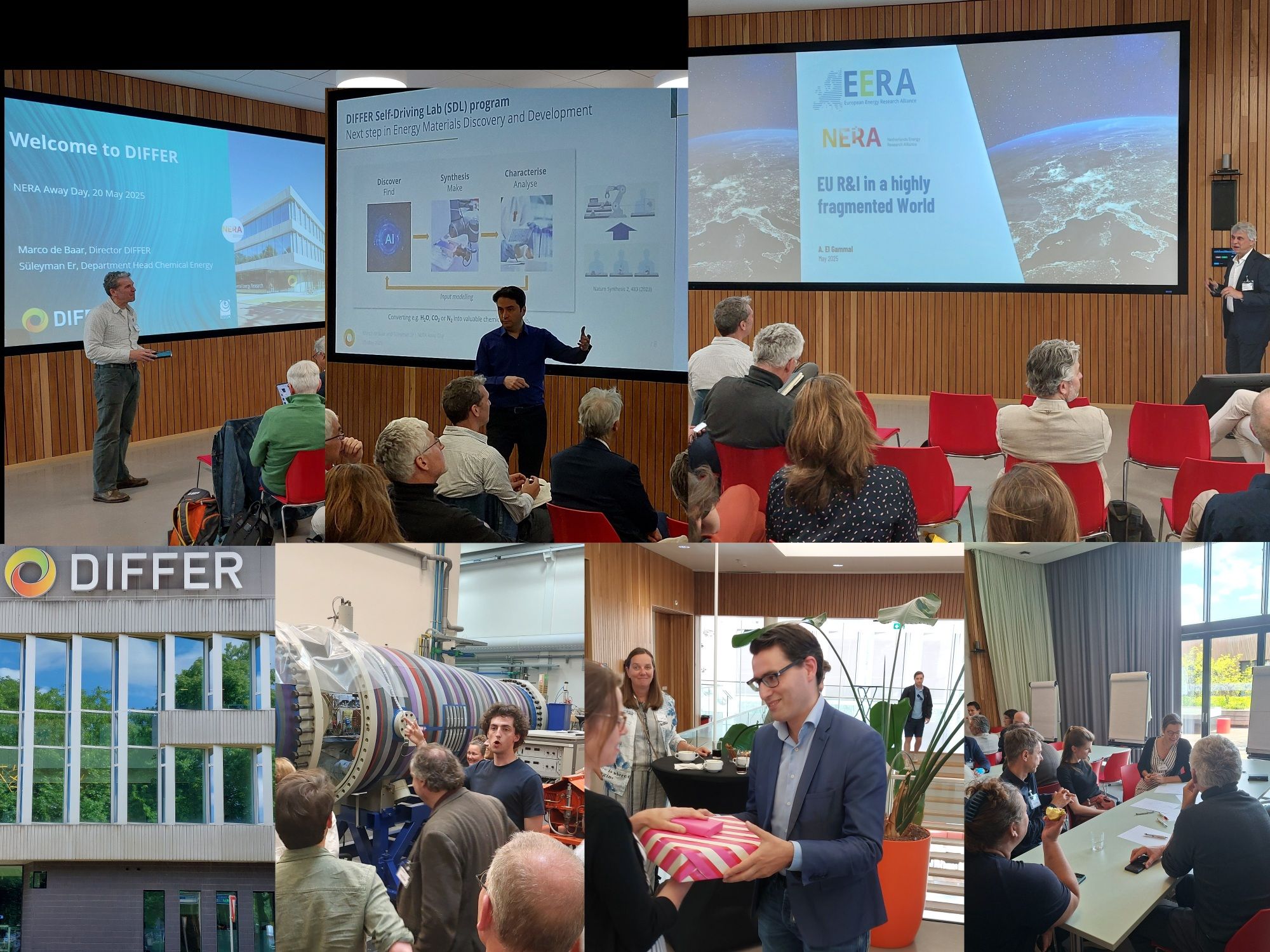
Dinsdag 20 mei was een inspirerende en energieke NERA Away Day!
Deze jaarlijkse bijeenkomst (ook wel NERA heidag genoemd) bracht leden van de NERA werkgroep, het bestuur en de wetenschappelijke raad bij elkaar. Deze keer was onze locatie DIFFER, gelegen op de campus van de Technische Universiteit Eindhoven – een perfecte omgeving voor tot nadenken stemmende discussies over de toekomst van energieonderzoek.
We trapten om 12:00 uur af met een welkomstlunch, waar aanwezigen de kans kregen om met elkaar in contact te komen. NERA voorzitter Andre Faaij opende het evenement en introduceerde onze nieuw benoemde General Secretary, Yorick W. Enters, tevens Policy Adviser bij DIFFER.
Vervolgens gaf DIFFER-directeur Marco De Baar een boeiend overzicht van DIFFER’s baanbrekende werk op het gebied van fusie-energie, materiaalkunde, elektrochemische processen en plasmatechnologieën.
Een ander fascinerend hoogtepunt kwam van Süleyman Er (hoofd van de afdeling Chemische Energie van DIFFER), die de nieuwste ontwikkelingen in AI-gestuurde, zelflerende laboratoria presenteerde. Deze baanbrekende innovaties versnellen de ontdekking van materialen voor groene brandstoffen en maken de weg vrij voor slimmere en duurzamere energieopslag.
We hadden de eer om Adel El Gammal, secretaris-generaal van EERA – The European Energy Research Alliance, te verwelkomen als voorname gast. Zijn tot nadenken stemmende toespraak over het geopolitieke landschap en de impact daarvan op de energietransitie leidde tot levendige discussies onder de aanwezigen.
Daarna kregen we een exclusieve rondleiding door de ultramoderne laboratoria en testfaciliteiten van DIFFER, onder leiding van NERA-werkgroeplid David van Walderveen, teamleider bij DIFFER.
Na een koffiepauze doken we in dynamische werksessies. Een belangrijk doel van de NERA Away Day is het evalueren van huidige activiteiten, het verkennen van toekomstige mogelijkheden en het verzamelen van waardevolle input van deelnemers.
Dit kwam tot uiting in thematische discussies over: 🔹 Geopolitieke verschuivingen die van invloed zijn op energieonderzoek en de energietransitie in Nederland 🔹 Opkomende en toekomstkritische onderwerpen 🔹 Potentieel voor nauwere samenwerking met EERA 🔹 Uitbreiding van de invloed en impact van NERA
De deelnemers droegen toekomstgerichte ideeën aan, waarvan er veel de komende maanden verder zullen worden uitgewerkt. Tegen 17:00 uur sloten we de formele agenda af met een welgemeend dankwoord aan alle deelnemers en een speciale waardering voor Adel El Gammal voor zijn bijdrage en zijn waardevolle inzichten.
Om feestelijk af te sluiten, hieven we tijdens het diner en de borrel het glas op voormalig Algemeen Secretaris Mark Boneschanscher. Mark bleef in zijn functie tot de benoeming van Yorick en bood essentiële begeleiding tijdens de overgang. Zijn toewijding en bijdragen aan NERA door de jaren heen zijn echt van onschatbare waarde geweest!
De NERA Away Day was een doorslaand succes en heeft ons nieuwe energie en momentum gegeven voor de toekomst! 🚀✨

Tuesday the 20th of May was an inspiring and energetic NERA Away Day!
This annual gathering (aka NERA heidag) brought together members of the NERA working group, board, and scientific board. This time, our venue was DIFFER, located on the Technische Universiteit Eindhoven campus—a perfect setting for thought-provoking discussions on the future of energy research.
We kicked off at 12:00 with a welcoming lunch, where attendees had the chance to connect. NERA Chairman Andre Faaij opened the event and introduced our newly appointed General Secretary, Yorick W. Enters, also Policy Adviser at DIFFER.
Next, DIFFER Director Marco De Baar provided a compelling overview of DIFFER’s groundbreaking work in fusion energy, materials science, electrochemical processes, and plasma technologies.
Another fascinating highlight came from Süleyman Er (Head of DIFFER’s Chemical Energy Department), who presented the latest advancements in AI-driven, self-learning laboratories. These cutting-edge innovations accelerate material discovery for green fuels, paving the way for smarter and more sustainable energy storage.
We were honored to welcome Adel El Gammal, Secretary General of EERA – The European Energy Research Alliance, as a distinguished guest. His thought-provoking speech on the geopolitical landscape and its impact on the energy transition sparked lively discussions among attendees.
Afterward, we embarked on an exclusive tour of DIFFER’s state-of-the-art labs and test facilities, led by NERA working group member David van Walderveen, Team Leader at DIFFER.
Following a coffee break, we dove into dynamic working sessions. A key objective of the NERA Away Day is to assess current activities, explore future opportunities, and gather valuable input from participants.
This materialized through thematic discussions on: 🔹 Geopolitical shifts impacting energy research in the Netherlands 🔹 Emerging and future-critical topics 🔹 Potential for deeper collaboration with EERA 🔹 Expanding NERA’s influence and impact
Participants contributed forward-thinking ideas, many of which will be further developed in the coming months. By 17:00, we concluded the formal agenda with heartfelt thanks to all contributors and a special appreciation for Adel El Gammal for his contribution and his valuable insights.
To end on a celebratory note, we raised a glass over dinner and drinks, paying tribute to former General Secretary Mark Boneschanscher. Mark remained in his role until Yorick’s appointment and provided essential guidance during the transition. His dedication and contributions to NERA over the years have been truly invaluable!
The NERA Away Day was a resounding success—fueling us with fresh energy and momentum for the future! 🚀✨
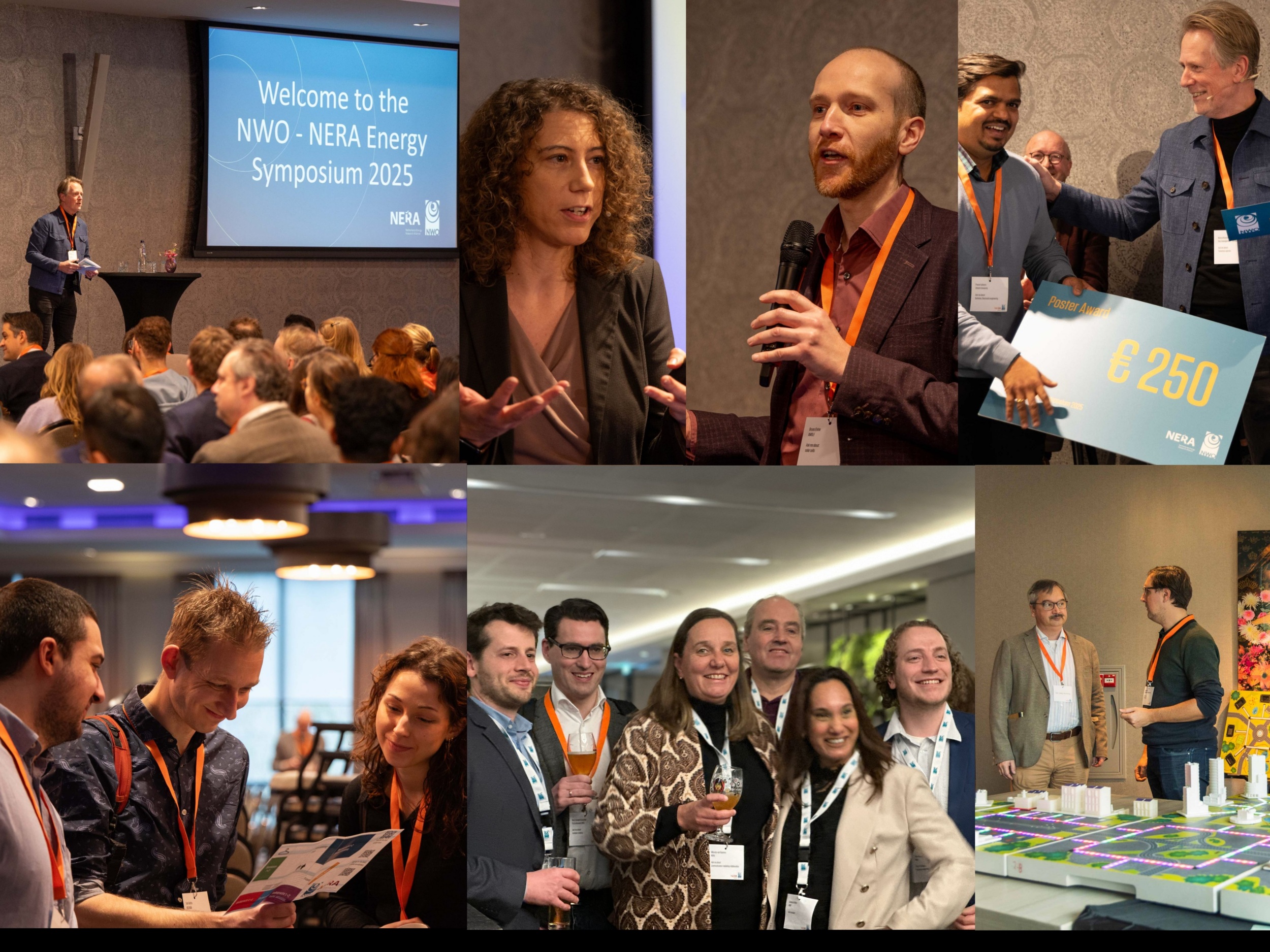
Meer dan 400 mensen bezochten afgelopen vrijdag 7 februari de derde editie van het NWO NERA Energy Symposium, waar de laatste ontwikkelingen in de wetenschap van de energietransitie werden gepresenteerd. Het was een genoegen on allen te zien en te ontmoeten op het NWO NERA Energy Symposium bij Van der Valk Utrecht.
Volgens de enthousiaste reacties hebben de aanwezigen en deelnemers genoten van een inspirerende dag vol interessante presentaties over de laatste ontwikkelingen in energieonderzoek. Veel bezoekers van het symposium hebben nieuwe contacten gelegd en zijn weer opgeladen om aan de slag te gaan met de energietransitie.
Klik op deze link om de foto-impressie van het symposium te bekijken:
We kregen zeer positieve reacties op het evenement en diverse berichten op LinkedIn:
Met inspirerende presentaties, workshops, projectposters en een posterwedstrijd werden de nieuwste resultaten gepresenteerd. Er was volop ruimte om te netwerken met bedrijven, beleidsmakers en wetenschappers uit verschillende disciplines.
De belangrijkste Keynote door Lena Kitzing van DTU – Technische Universiteit van Denemarken was een krachtige herinnering: hoewel zonne- en windenergie snel groeien, moeten we nog sneller gaan om onze energiedoelen te halen. Bekijk de Keynote hier.
Tijdens het symposium werd het nieuwe initiatief “Young NERA” gelanceerd. Dit is de uitgelezen kans voor opkomende onderzoekers om samen te werken aan cruciale onderwerpen, de impact van hun werk uit te breiden tot buiten de academische wereld en contacten te leggen met andere universiteiten en onderzoeksinstituten die energieonderzoek doen. Inschrijven + informatie hier.
NERA Nieuwsbrief
Blijf op de hoogte van nieuws en evenementen: meld je hier aan voor de NERA Nieuwsbrief.
Namens iedereen bij NERA onze hartelijke dank aan alle aanwezigen en deelnemers, en iedereen die betrokken was bij de organisatie van dit succesvolle evenement!

More than 400 people attended the third edition of the NWO NERA Energy Symposium last friday the 7th of February, where the latest developments in the science of energy transition were presented.
It was a pleasure to see and meet you at the NWO NERA Energy Symposium at Hotel Van der Valk Utrecht.
According to the reactions, the attendees and contributors enjoyed an inspiring day filled with interesting presentations about the latest developments in energy research. Many visitors of the symposium made new contacts and are re-charged to work on the energy transition.
Click this link to see the photo impression of the symposium.
We enjoyed very positive reactions at the event, and posts on LinkedIn:
https://lnkd.in/dufVecZP
https://lnkd.in/dEZyVf2K
https://lnkd.in/d35pcVub
https://lnkd.in/dQdEYQK3
With inspiring presentations, workshops, project posters and a poster contest, the latest results were presented. There was plenty of room to network with companies, policymakers, and scientists from various disciplines. All to answer that one question: ‘how do we get the energy transition going again?
The main Keynote by Lena Kitzing from DTU – Technical University of Denmark was a powerful reminder: while solar and wind are scaling rapidly, we need to 𝗴𝗼 𝗲𝘃𝗲𝗻 𝗳𝗮𝘀𝘁𝗲𝗿 to hit our energy targets. Find the Keynote here.
At the symposium, the new exciting initiave of “Young NERA” was launched.
This is the golden opportunity for emerging researchers to collaborate on pivotal topics, extend the impact of their work beyond academia, and forge connections with other universities and research institutes that conduct energy research. Sign-up + information here: https://lnkd.in/df2mngDM
NERA Newsletter
Keep up to date on news and events: sign up to the NERA Newsletter here: https://lnkd.in/dsuVc7Z5
A big thanks to all attendees and contibutors, and all involved in the organisation of the event!
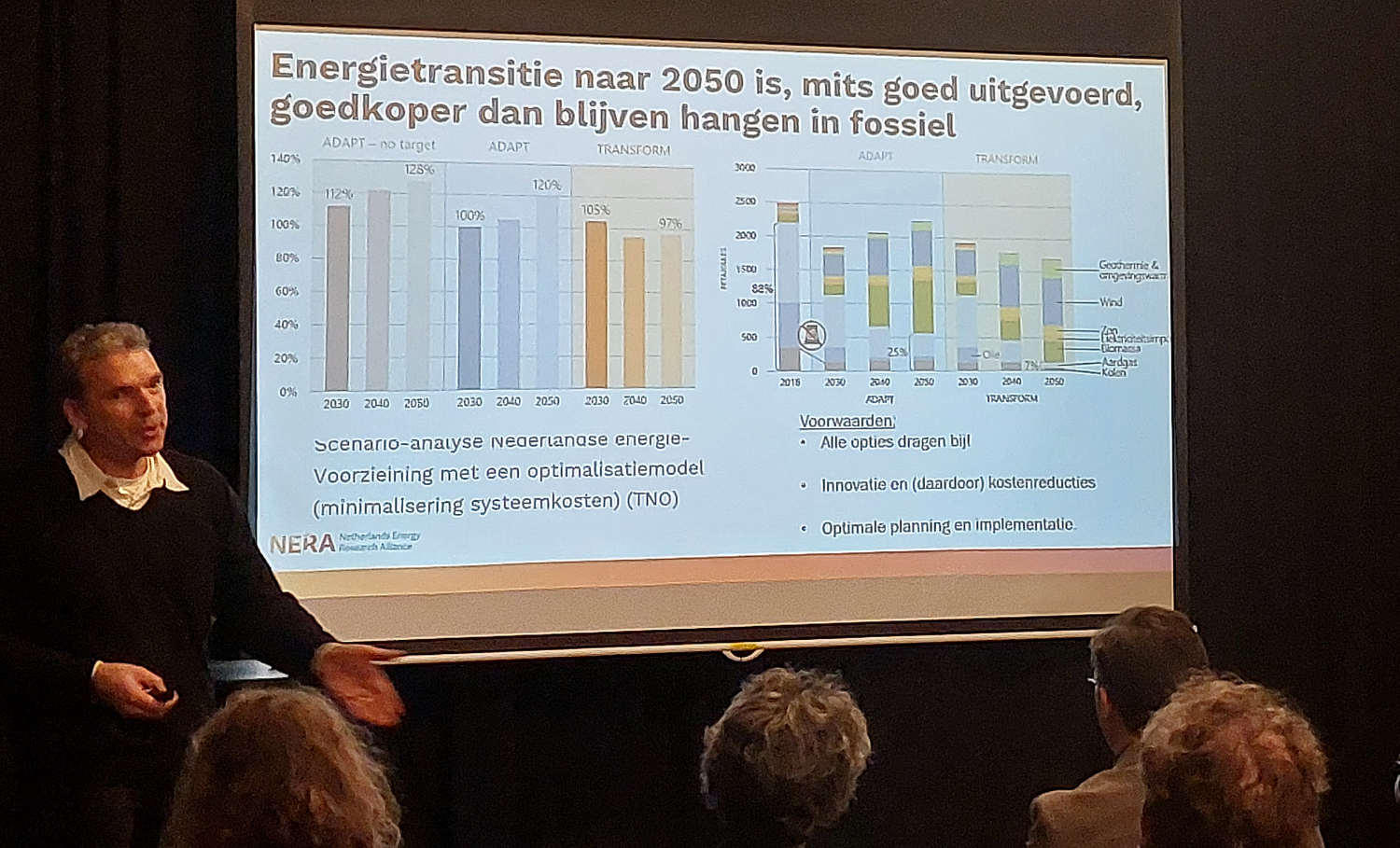
Universiteiten van Nederland en Netherlands Energy Research Alliance (NERA) organiseerden op maandag 11 november het Kenniscafé Waarde van Wetenschap voor Energieonderzoek in Dudok in Den Haag.
Wat is het belang van energieonderzoek voor de samenleving? Hoe kan het onderzoeks- en innovatiesysteem in Nederland bijdragen aan de grote maatschappelijke opgave van de energietransitie? Kortom, wat is de Waarde van Wetenschap voor Energie? De antwoorden op deze vragen stonden deze middag centraal.
André Faaij – voorzitter NERA, wetenschappelijk directeur TNO Energie- en Materialentransitie gaf een presentatie (PDF) over ‘De waarde van (ons) energie-onderzoek’.
Lancering van de EnergieHelpdesk
Veel mensen zijn op zoek naar betrouwbare en eenvoudig te begrijpen informatie over de energietransitie. Maar het vinden van die weteninformatie op het internet is nog niet zo makkelijk.
De EnergieHelpdesk is dé plek waar wetenschappers antwoorden geven op energie-gerelateerde vragen uit de samenleving. Elke vraag word beantwoord door een actieve wetenschapper of deskundige die die expert is op een specifiek vakgebied. De EnergieHelpdesk is een samenwerking tussen NERA en de KlimaatHelpdesk.
Het publiek ging tijdens het Kenniscafé in gesprek met wetenschappers vanuit verschillende disciplines, waaronder:
Linda Steg – hoogleraar omgevingspsychologie, Rijksuniversiteit Groningen
Martijn Groenleer – hoogleraar bestuurskunde, Tilburg University
Simon Tindemans – UHD Intelligent Electrical Power Grids, TU Delft
Pascal Buskens – hoofdonderzoeker bij TNO en hoogleraar Nanostructurele Materialen, Universiteit Hasselt
Joeri Reinders – voorzitter Stichting KlimaatHelpdesk en EnergieHelpdesk, Universiteit Leiden
Maarten Appelman – doet een PhD aan de Universiteit Twente op het onderwerp Energy Access in het globale zuiden
Heb je een vraag? Ga dan naar de EnergieHelpdesk: https://energiehelpdesk.org/
Link naar Waarde van Wetenschap/Energie: https://www.universiteitenvannederland.nl/waarde-van-wetenschap/energie

Universities of the Netherlands and the Netherlands Energy Research Alliance (NERA) organised the “Knowledge Café Value of Science for Energy Research” on Monday, 11 November at Dudok in The Hague.
What is the importance of energy research for society? How can the research and innovation system in the Netherlands contribute to the major societal task of energy transition? In short, what is the Value of Science for Energy? The answers to these questions took centre stage this afternoon.
André Faaij – chairman of NERA, scientific director TNO Energy and Materials Transition gave a presentation (PDF) on ‘The value of (our) energy research’.
Launch of the Energy Helpdesk
Many people are looking for reliable and easy-to-understand information on the energy transition. But finding that knowledge information on the internet is not so easy.
The EnergieHelpdesk is the place where scientists provide answers to energy-related questions from society. Each question is answered by an active scientist or expert in a specific field. The EnergyHelpdesk is a collaboration between NERA and the ClimateHelpdesk.
The audience interacted with scientists from different disciplines during the Knowledge Café, including:
Linda Steg – professor of Environmental Psychology, University of Groningen
Martijn Groenleer – Professor of Public Administration, Tilburg University
Simon Tindemans – UHD Intelligent Electrical Power Grids, TU Delft
Pascal Buskens – principal investigator at TNO and professor of Nanostructural Materials, Hasselt University
Joeri Reinders – chairman Climate Helpdesk Foundation and Energy Helpdesk, Leiden University
Maarten Appelman – is doing a PhD at the University of Twente on the topic of Energy Access in the Global South
Got a question? Then go to the EnergyHelpdesk: https://energiehelpdesk.org/
Link to Value of Science/Energy: https://www.universiteitenvannederland.nl/waarde-van-wetenschap/energie
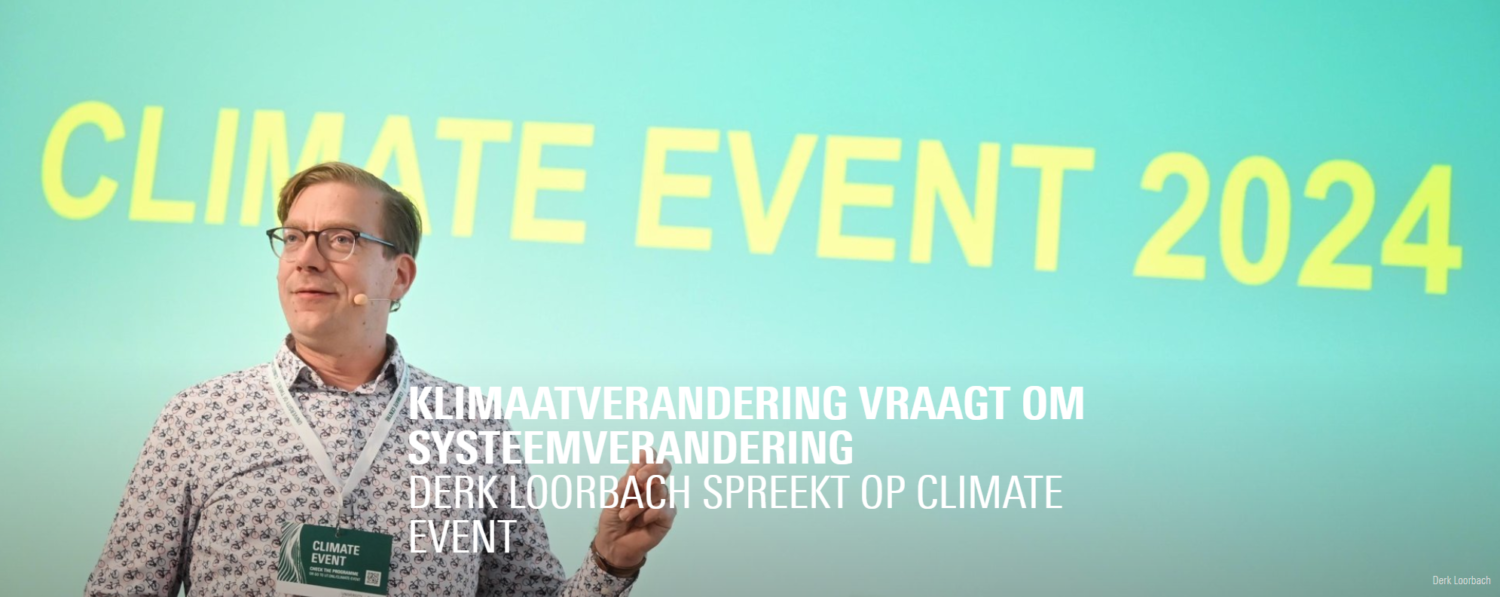
Op dinsdag 5 november organiseerde het Climate Centre van de Universiteit Twente hun allereerste Climate Event. Een inspirerende dag voor onderzoekers, professionals, beleidsmakers en studenten die willen samenwerken om klimaatverandering aan te pakken. Derk Loorbach, recent benoemd tot wetenschappelijk boegbeeld van het Klimaatonderzoek Initiatief Nederland, was een van de keynotesprekers.
Technologische innovatie is belangrijk, maar tijdens het Climate Event benadrukte Loorbach dat echte verandering ook -en misschien nog wel meer- vraagt om het aanpakken van diepere, sociaaleconomische structuren. Volgens hem zitten veel technologische en economische onderzoekers gevangen in een groeimodel. “Veel wat we nu duurzaamheid noemen, draait om de vraag hoe we met slimme innovaties net iets langer kunnen doorgaan waar me mee bezig zijn,” vertelt hij, “Daarmee houden we het onhoudbare ‘business as usual’ in stand.
Meer informatie over dit event:
https://www.utwente.nl/nieuws/2024/11/1842621/klimaatverandering-vraagt-om-systeemverandering

On Tuesday the 5th of November, the Climate Centre at the University of Twente organised their very first Climate Event. An inspiring day for researchers, professionals, policymakers and students who want to work together to tackle climate change. Derk Loorbach, recently appointed scientific figurehead of the Netherlands Climate Research Initiative, was one of the keynote speakers.
Technological innovation is important, but at the Climate Event, Loorbach stressed that real change also -and perhaps even more- requires addressing deeper, socio-economic structures. According to him, many technological and economic researchers are trapped in a growth model. ‘Much of what we now call sustainability revolves around how we can continue what we are doing just a little bit longer with smart innovations,‘ he explained, “In doing so, we maintain the unsustainable ”business as usual’.
More information about this event:
https://www.utwente.nl/nieuws/2024/11/1842621/klimaatverandering-vraagt-om-systeemverandering
 Op maandag 4 november 2024 lanceerde de Universiteit van Amsterdam een nieuw klimaatinstituut genaamd “SEVEN”, waarin alle zeven faculteiten samenwerken. De missie van het instituut is om door middel van transdisciplinaire projecten nieuwe inzichten bij te dragen aan eerlijke oplossingen voor de uitdagingen van klimaatverandering en klimaatadaptatie. Elk project zal specialistische kennis van verschillende (alfa, bèta en gamma) disciplines samenbrengen, evenals de kennis, ervaringen en zorgen van relevante belanghebbenden.
Op maandag 4 november 2024 lanceerde de Universiteit van Amsterdam een nieuw klimaatinstituut genaamd “SEVEN”, waarin alle zeven faculteiten samenwerken. De missie van het instituut is om door middel van transdisciplinaire projecten nieuwe inzichten bij te dragen aan eerlijke oplossingen voor de uitdagingen van klimaatverandering en klimaatadaptatie. Elk project zal specialistische kennis van verschillende (alfa, bèta en gamma) disciplines samenbrengen, evenals de kennis, ervaringen en zorgen van relevante belanghebbenden.
Meer informatie:
https://seven.uva.nl/over-seven/over-seven.html

On Monday, November 4, the University of Amsterdam launched a new climate institute named “SEVEN, in which all seven faculties collaborate. Its mission is to contribute novel insights on fair solutions to the challenges of climate change and climate adaptation through transdisciplinary projects. Each project will bring together specialist knowledge from a variety of (alpha, beta and gamma) disciplines as well as the knowledge, experiences and concerns of relevant stakeholders.
More information:
Wageningen University & Research is het nieuwste lid van NERA. In deze video spreken Bram de Vos en Chris de Visser van Wageningen University & Research over de voordelen van samenwerking met andere onderzoeksinstellingen en universiteiten om de energietransitie op te lossen, en over hun nieuwe aansluiting bij NERA.
Wageningen University & Research has become the newest member of NERA. In this video, Bram de Vos and Chris de Visser of Wageningen University & Research speak about the advantages of working together with other research institutions and universities to solve the energy transition, and about their new connection to NERA.
Eind mei kwamen leden van de NERA werkgroep en Wetenschappelijke Raad bij elkaar tijdens de NERA Away Day 2024 (heidag). De locatie was The Green Village, fieldlab voor duurzame innovatie op de TU Delft Campus. De dag werd geopend door NERA-voorzitter Andre Faaij. Hierna kregen we een presentatie van Marjan Kreijns en vervolgens een rondleiding door het fieldlab door Arnoud van der Zee, die uitleg gaf over de verschillende projecten.
Daarna was het tijd om aan de slag te gaan met verschillende workshops. Het resultaat zijn concrete activiteiten voor de komende tijd waar de leden mee aan de slag gaan. We kijken terug op een prachtige middag waarin persoonlijke gesprekken en kennisuitwisseling centraal stonden. Dit gaf ons veel nieuwe energie!
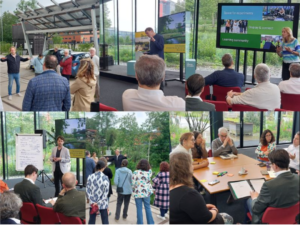
Last Friday, members of the NERA working group and Scientific Board met up during the NERA Away Day 2024. The location was The Green Village, field lab for sustainable innovation at TU Delft Campus. The day was opened by NERA chairman Andre Faaij. After this, we were given a presentation by Marjan Kreijns and then a tour of the field lab by Arnoud van der Zee, who gave an explanation about the various projects.
Then it was time to get started with various workshops. The result are concrete activities for the coming period that members will work on. We look back on a wonderful afternoon where personal conversations and the exchange of knowledge were key elements. This gave us lots of new energy!

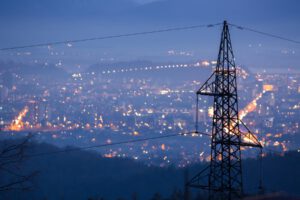
Successful symposium on latest Energy research
Looking back on a successful
NWO NERA Energy Symposium 2024!
On February 2, 2024, the second edition of the NWO NERA Energy Symposium took place. This year’s theme was “Energy Transition – Working Together for a Sustainable Future”.
Inspiring presentations and workshops highlighted the latest results in energy research during the event. In addition, the symposium provided a place for hundreds of researchers and policy makers from different disciplines to meet.
The energy transition is a challenge that requires solutions from many disciplines, ranging from technical innovations for batteries, to strategies to get citizens to make sustainable decisions. An interdisciplinary approach can be very successful in accelerating the energy transition.
Take a look at the photo impression of this succesful event here:
Tilburg University heeft zich als mens- en maatschappij universiteit aangesloten bij NERA, de Netherlands Energy Research Alliance, om de samenwerking met andere universiteiten, hogescholen en kennisinstellingen op het gebied van energie-onderzoek te versterken.
De leden van NERA ontwikkelen gezamenlijk onderzoeksagenda’s en pleiten voor sterke en effectieve onderzoeks- en R&D programma’s bij onderzoeksfinanciers. Ook delen ze kennis onderling en met de samenleving.
Sociale innovatie
De aansluiting van NERA past in de bredere strategie van Tilburg University om onderzoek naar klimaatveranderings- en energievraagstukken te stimuleren vanuit de sociale en geesteswetenschappen. Onlangs is de universiteitsbrede Academische Werkplaats Klimaat en Energie van start gegaan, waarin de universiteit samen met maatschappelijke en kennispartners zoekt naar sociale innovaties die kunnen bijdragen aan de energietransitie. De aanpak van de klimaatcrisis vereist een transitie van de hele samenleving, en sociale innovaties zijn daarbij net zo essentieel als de technologische innovaties waar vaak als eerste naar wordt gezocht.
Gedragsverandering
Er is een groeiende behoefte aan omdenken om sneller af te kunnen stappen van fossiele brandstoffen, aan innovatieve bedrijfsmodellen en aan financieringsinstrumenten om een duurzame economie tot stand te brengen. De Academische Werkplaats Klimaat en Energie wil ervaringen en nieuwe ideeën uitwisselen, bijvoorbeeld over welke slimme interventies het gedrag van burgers en bedrijven kunnen veranderen. Mogelijk vragen die ook om nieuwe wet- en regelgeving en inclusief beleid om ervoor te zorgen dat de energietransitie betaalbaar is voor iedereen.
In de onderstaande video spreekt Saskia Lavrijssen, Professor of Economic Regulation and Market Governance of Network Industries at Tilburg University, over de redenen van de universiteit om zich bij NERA aan te sluiten.
As a humanities and society university, Tilburg University has joined NERA, the Netherlands Energy Research Alliance, to strengthen cooperation with other universities, colleges and knowledge institutions in the field of energy research.
NERA members jointly develop research agendas and advocate for strong and effective research and R&D programs with research funders. They also share knowledge among themselves and with society.
Social innovation
NERA’s affiliation fits into Tilburg University’s broader strategy to stimulate research on climate change and energy issues from the social sciences and humanities. Recently, the university-wide Academic Workshop on Climate and Energy was launched, in which the university, together with social and knowledge partners, seeks social innovations that can contribute to the energy transition. Tackling the climate crisis requires a transition of the entire society, and social innovations are as essential to this as the technological innovations often sought first.
Behavior change
There is a growing need for rethinking to accelerate the move away from fossil fuels, innovative business models and financing instruments to create a sustainable economy. The Academic Workshop on Climate and Energy wants to exchange experiences and new ideas, for example about which smart interventions can change the behavior of citizens and companies. These may also require new laws and regulations and inclusive policies to ensure that the energy transition is affordable for all. In this video, Saskia Lavrijssen, Professor of Economic Regulation and Market Governance of Network Industries at Tilburg University, talks about the university’s reasons for joining NERA.
Op dinsdag 9 mei 2023 kwamen de leden van de NERA Werkgroep en de NERA Scientific Board bijeen in de Energy Barn van EnTranCe in Groningen voor de jaarlijkse NERA Away Day (“heidag”).
Met als doel nieuwe leden te ontmoeten en/of elkaar (weer) te zien. En om met elkaar te praten over recente energiegerelateerde ontwikkelingen, nieuwe initiatieven van NERA te prioriteren en ideeën en mogelijke samenwerkingen te bespreken.
Na de inlooplunch luisterden we naar een welkomstwoord van NERA algemeen secretaris Mark Boneschanscher en NERA-voorzitter André Faaij. Vervolgens gaf professor Marten van der Laan een presentatie over de ontwikkeling van de Waterstofeconomie in Noord-Nederland. Hierna gaf Marten gaf ons daarna een rondleiding bij EnTranCe, waar verschillende testlocaties worden gebouwd om waterstof en gecombineerde energienetten te testen.
Vervolgens kwamen de leden in drie groepen bij elkaar om nieuwe ideeën voor NERA-activiteiten te bespreken en een topvolgorde te vormen. Na de koffiepauze werd een brainstormsessie gehouden over hoe het doel van de belangrijkste actiepunten kan worden bereikt. Kortom, de NERA Away Day gaf ons allen nieuwe energie en ideeën om op te volgen!
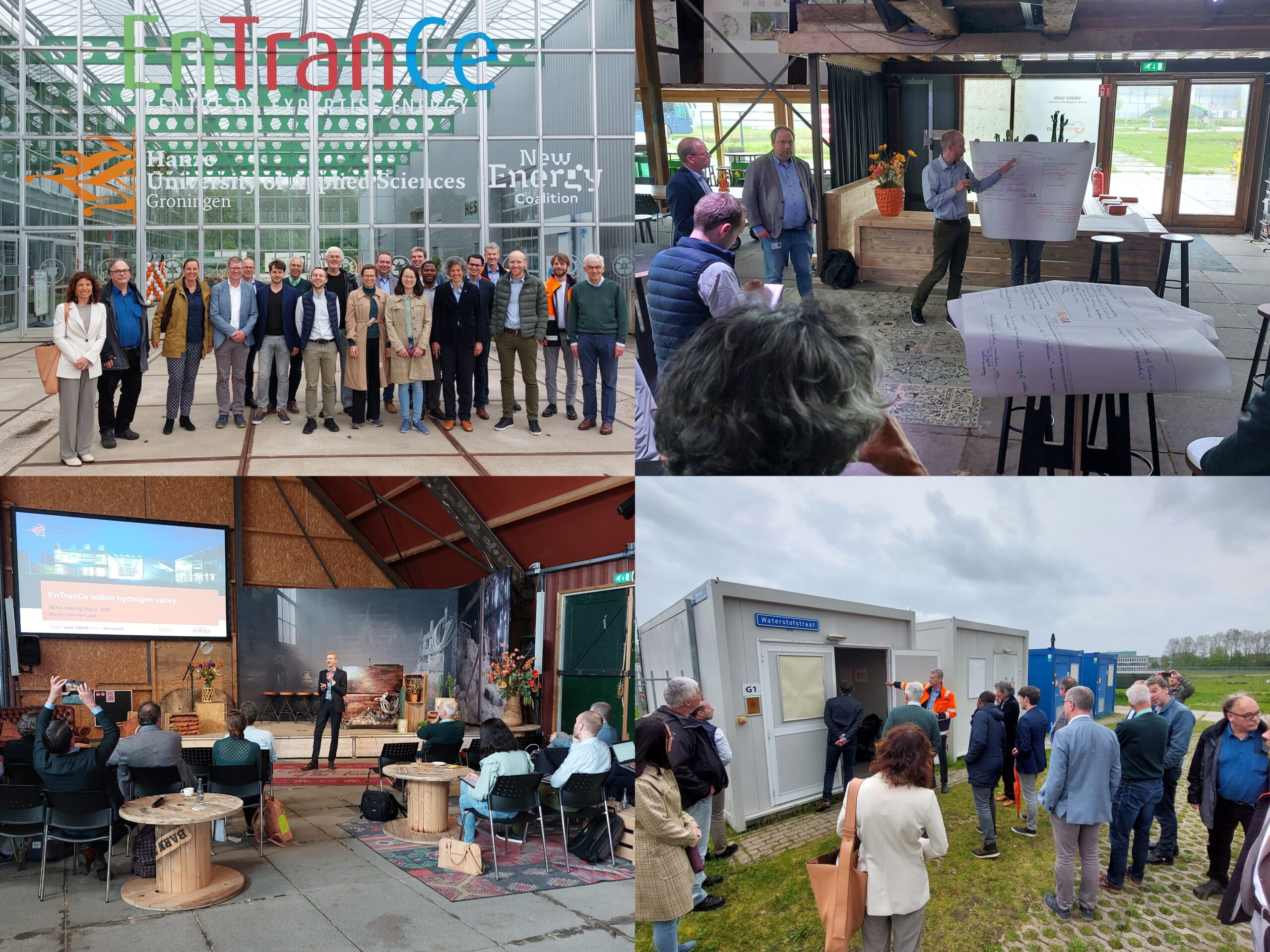
On Tuesday the 9th of may 2023 the Members of the NERA Working Group and the NERA Scientific Board met up at the Energy Barn at EnTranCe | Centre of Expertise Energy in Groningen for the annual NERA Away Day (‘heidag”).
With the purpose to meet new members and/or see each other (again). And to talk to each other about recent energy related developments, to prioritize new initiatives of NERA, and to discuss ideas and possible collaborations.
After the walk-in lunch, we listened to a word of welcome from NERA general secretary Mark Boneschanscher and NERA chairman Andre Faaij. Then, professor Marten van der Laan gave a presentation about the development of the Hydrogen Economy in the North of the Netherlands. Hereafter, Marten gave us a tour at EnTranCe, where different test sites are build to test hydrogen and combined energy grids.
Then the members gathered in three groups to discuss new ideas voor NERA activities and to form a top order for them. After the coffee break, a brainstorm session was held about how to reach the target of the main action points. To sum it all up, the NERA Away Day gave us all new energy and ideas to follow up on!

Geïnteresseerd?
ENLENS-activiteiten en onderzoeksoutputs kunnen hier en via de ENLENS LinkedInCommunity worden gevolgd.
Late 2022, the University of Amsterdam has launched a university-wide Research Priority Area on the Energy Transition through the lens of Sustainable Developments Goals (ENLENS) is one of the interfaculty research priority areas of the University of Amsterdam. It unites researchers working on economic, environmental, technological, social, political, and business aspects of the energy system, the energy transition, and Sustainable Developments Goals.
Thematic focus
Behind ENLENS is the recognition that urgent need to rapidly reduce carbon dioxide emissions shapes decisions on how to define, design, and implement the energy transition in the Netherlands. This will affect the economy as well as daily lives of the population, not only in the Netherlands, but also elsewhere in the world. The energy transition is hence closely intertwined with essentially all Sustainable Developments Goals (SDGs), but its wider effects are seldom taken into account or studied in detail. The goal of this interdisciplinary initiative is to stimulate and initiate research across faculties that maps the energy transition in the Netherlands and Europe against the SDGs beyond Dutch borders.
During the ENLENS launch on December 13, professor Shonali Pachauri (IIASA) gave a keynote, in which she emphasized the need to focus energy transition efforts around the globe on energy needs rather than supply systems; and second, argued for actively searching for ways of integrating solutions to meet energy needs with ways to meet water, food and other needs, as appears to be often well possible. Synergy between solutions to different needs then becomes a matter of using capital efficiently. This perspective is now the basis of the OECD monitor for well-being and sustainability. For ENLENS this means, that analyzing energy transition strategies’ implications for other SDGs must be seen as crucial – not, of course, to slow down the energy transition but to translate objections against it into opportunities to adapt these strategies so as to become more acceptable.
Activities
Researchers from at least two of the participating faculties – Economics and Business Administration, Humanities, Law, Science, and Social and Behavioural Sciences – may submit proposals for seed grants to prepare a bigger grant proposal on a topic within the broad ENLENS theme.
ENLENS researchers will exchange knowledge and discuss each other’s work at the Future of Energy Seminars, sponsored by the UvA Institute of Advanced Studies.
Interested?
ENLENS activities and research outputs may be followed here, and through the ENLENS LinkedInCommunity.
“Er is zoveel kennis in de academische wereld. Stel je voor wat we kunnen bereiken als we al die kennis samenbrengen om klimaatoplossingen te co-creëren.”
– Prof. Saskia Lavrijssen

Klimaatverandering is een van de grootste uitdagingen van onze tijd. Aangezien de vraag naar nieuwe energiebronnen in een ongekend tempo blijft stijgen, brengt Tilburg University wetenschap en maatschappij samen om bij te dragen aan een inclusieve, rechtvaardige en snelle overgang van schadelijke energiebronnen naar hernieuwbare alternatieven.
Voortbouwend op een lange traditie van sociaal-wetenschappelijk, juridisch en bestuurlijk onderzoek op het gebied van klimaat- en energietransitie, hebben onderzoekers van verschillende disciplines en faculteiten hun krachten gebundeld in de Academische werkplaats over klimaatverandering en een slimme en sociale energietransitie. Lees verder voor meer informatie over het wat, hoe, waarom en wie van het centrum.
Wat?
Het Academisch Samenwerkingscentrum Klimaatverandering en een Slimme en Sociale Energietransitie is een interdisciplinair samenwerkingsverband tussen onderzoekers van Tilburg University die samenwerken om de klimaatcrisis aan te pakken door middel van baanbrekend onderzoek en outreach. Het is een ruimte waar een breed scala aan disciplines samenkomt – van recht tot economie en van bestuur tot psychologie. Het centrum schakelt ook maatschappelijke partners in, zoals overheden, bedrijven en lokale initiatieven. Door onze krachten te bundelen, dragen we bij tot een snelle en sociaal rechtvaardige overgang naar een duurzame samenleving.
Hoe?
Door samenwerking over de vakgebieden heen en met maatschappelijke partners wil het Center het innovatieve klimaat- en energieonderzoek van Tilburg University buiten de academische muren en in de maatschappij brengen. Bijvoorbeeld door bij te dragen aan nieuwe wet- en regelgeving die de energietransitie kan versnellen, of door prikkels te ontwikkelen die gedragsverandering bij individuen en gemeenschappen bevorderen. Maar ook door organisaties te helpen nieuwe circulaire bedrijfsmodellen in te voeren, en door samenwerking tussen overheden, bedrijven en maatschappelijke organisaties te faciliteren.
Waarom?
De klimaatcrisis duurt al tientallen jaren en heeft ernstige gevolgen voor individuen en gemeenschappen over de hele wereld. Technologische vooruitgang kan bijdragen tot klimaatoplossingen enKlimaatverandering is een van de grootste uitdagingen van onze tijd. Omdat de vraag naar nieuwe energiebronnen in een ongekend tempo blijft stijgen, brengt Tilburg University wetenschap en maatschappij samen om bij vermindering van de uitstoot van broeikasgassen, maar technologie alleen is niet genoeg. We hebben nieuwe wetten nodig om sneller af te stappen van fossiele brandstoffen, duurzame bedrijfsmodellen om tot een circulaire economie te komen, op psychologie gebaseerde interventies om individueel gedrag bij te sturen, en goed bestuur om ervoor te zorgen dat de energietransitie niet ten koste gaat van reeds gemarginaliseerde groepen. De aanpak van de klimaatcrisis vereist een transitie in de hele samenleving, niet alleen in de energiesector, en sociale innovaties zijn net zo essentieel als technologische innovaties. Daarom benadert het Center klimaat- en energievraagstukken vanuit een sociaal-wetenschappelijk en geesteswetenschappelijk perspectief, waarbij juridische, economische, psychologische, bestuurlijke, organisatorische, filosofische, technische en sociale kennis wordt gecombineerd – en die kennis in praktijk wordt gebracht.
Wie?
Het Academic Collaborative Center wordt geleid door professor Saskia Lavrijssen en professor Martijn Groenleer. Het Center bouwt voort op bestaande universiteitsbrede samenwerkingsverbanden zoals de Climate & Energy Transition Community en het Tilburg Sustainability Center, en omvat discipline- en instellingsoverstijgende onderzoeksprogramma’s zoals NEON, MEGAMIND, VIA AUGUSTA en LONGA VIA. Daarnaast verbindt het Center onderzoekers die werken aan klimaat- en energievraagstukken binnen de context van de verschillende signatuurplannen en sectorplannen van Tilburg Law School.
“There’s so much knowledge in academia. Imagine what we can achieve if we bring all that knowledge together to co-create climate solutions.”
— Prof. Saskia Lavrijssen 
Climate change is one of the biggest challenges of our time. As the demand for new energy resources continues to rise at an unprecedented pace, Tilburg University brings together science and society to contribute to an inclusive, just and speedy transition from harmful energy sources to renewable alternatives.
Building on a long tradition of social science, legal and governance research in the area of climate and energy transition, researchers from across disciplines and faculties have joined forces in the Academic Collaborative Center (‘Academische werkplaats’) on Climate Change and a Smart and Social Energy Transition. Read on to learn more about the what, how, why and who of the Center.
What?
The Academic Collaborative Center on Climate Change and a Smart and Social Energy Transition is an interdisciplinary alliance between Tilburg University researchers who work together to address the climate crisis through cutting-edge research and outreach. It is a space where a wide range of disciplines come together—from law to economics and from governance to psychology. The Center also engages societal partners, such as governments, companies and local initiatives. By joining forces, we contribute to a speedy and socially just transition to a sustainable society.
How?
Through collaborations across fields and with social partners, the Center aims to take Tilburg University’s innovative climate and energy research beyond the academic walls and into society. By contributing to new laws and regulations that can accelerate the energy transition, for example, or by crafting incentives that promote behavioral change in individuals and communities. But also by helping organizations adopt new circular business models, and by facilitating cooperation between authorities, businesses and civil society organizations.
Why?
The climate crisis has been building for decades, bringing severe consequences for individuals and communities around the world. Technological advancements can help drive climate solutions and reduce greenhouse gas emissions, but technology alone is not enough. We need new laws to accelerate the shift away from fossil fuels, sustainable business models to achieve a circular economy, psychology-based interventions to redirect individual behavior, and good governance to ensure the energy transition does not disadvantage already marginalized groups. Tackling the climate crisis requires a transition across society as a whole, not just the energy sector, and social innovations are just as essential as technological innovations. That’s why the Center addresses climate and energy issues from a social sciences and humanities perspective, combining legal, economic, psychological, governance, organizational, philosophical, technical and social knowledge—and putting that knowledge into action.
Who?
The Academic Collaborative Center is led by professor Saskia Lavrijssen and professor Martijn Groenleer. The Center builds on existing university-wide collaborations such as the Climate & Energy Transition Community and the Tilburg Sustainability Center, incorporating cross-disciplinary and cross-institution research programs such as NEON, MEGAMIND, VIA AUGUSTA and LONGA VIA. In addition, the Center connects researchers working on climate and energy issues within the contexts of Tilburg Law School’s various signature plans and sector plans.
Bekijk nu de aftermovie van het NWO-NERA Energie Symposium!
Op 11 november 2022 vond het eerste NWO-NERA Energie Symposium plaats, met als doel: “Bevordering van interdisciplinair onderzoek naar een succesvolle energietransitie”. Hier kwamen wetenschappers, studenten, onderzoekers en andere stakeholders samen.
Watch the aftermovie of the NWO-NERA Energy Symposium now!
The first NWO-NERA Energy Symposium took place on November 11, 2022, with the goal of “Promoting interdisciplinary research towards a successful energy transition.” Here scientists, students, researchers and other stakeholders came together.
NERA als de brancheorganisatie voor het energieonderzoek in Nederland. Gezien de evaluatie van de NWA goed om dit interview met Wim Sinke (TNO) over de rol van NERA weer terug te kijken. Intussen is de Scientific Board flink in ontwikkeling en zijn we samen met NWO druk bezig de eerste nationale energieonderzoeksconferentie te organiseren. Meer weten? Neem dan contact op met je lokale Scientific Board lid, of email secretaris@nera.nl
NERA as the trade association for energy research in the Netherlands. Given the evaluation of the NWA, good to revisit this interview with Wim Sinke (TNO) on NERA’s role. Meanwhile, the Scientific Board is developing considerably and we are busy organising the first national energy research conference together with NWO. Want to know more? Then contact your local Scientific Board member, or email secretaris@nera.nl
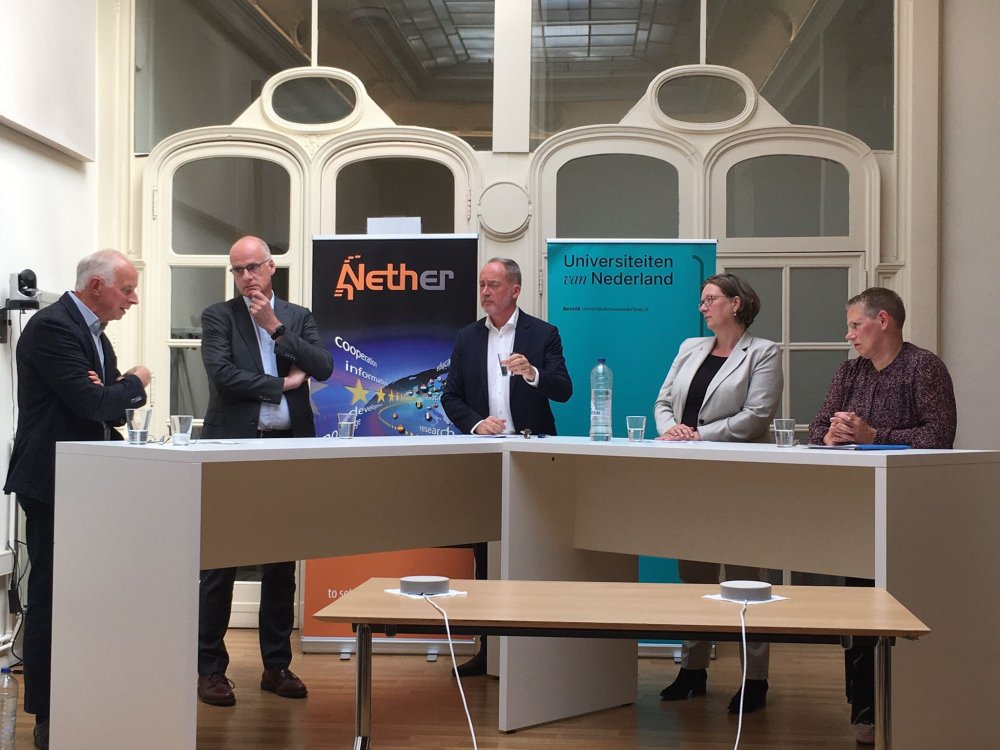
Wat heeft de Green Deal in petto voor onderzoek en hoe kunnen we ervoor zorgen dat kennisinstellingen co-creators zijn? Dit evenement, gemodereerd door Jurgen Rienks, directeur van Neth-ER, had als doel deze vragen te beantwoorden. Anastasios Kentarchos, Adviseur Klimaatwetenschap & Innovatie bij het Directoraat-Generaal Onderzoek & Innovatie van de Europese Commissie, trapte het evenement af door het beleid en de mogelijkheden voor onderzoek in relatie tot de Green Deal op EU-niveau te belichten. Daarna volgde een paneldiscussie over de Green Deal onderzoeksactiviteiten, ambities en behoeften van kennisinstellingen en de Nederlandse overheid, met Kornelis Blok (voorzitter TU Delft Energy Initiative en hoogleraar Energy Systems Analysis, voormalig voorzitter NERA -Netherlands Energy Research Alliance), Joep Houterman (voorzitter College van Bestuur Fontys Hogescholen), Tirza van Daalen (directeur Geological Survey of the Netherlands bij TNO) en Ineke Hoving-Nienhuis (coördinator Horizon Europe bij het Ministerie van Economische Zaken en Klimaatbeleid).
Lees meer hier.

What does the Green Deal have in store for research and how to ensure that knowledge institutions are co-creators? This event, moderated by Jurgen Rienks, director of Neth-ER, aimed to answer these questions. Anastasios Kentarchos, Adviser Climate Science & Innovation at Directorate-General Research & Innovation of the European Commission, kicked off the event by highlighting the policies and possibilities for research in relation to the Green Deal at EU level. Subsequently a panel discussion followed on the Green Deal research activities, ambitions and needs of knowledge institutions and the Dutch government, with Kornelis Blok (Chair of the TU Delft Energy Initiative and Professor of Energy Systems Analysis, Chairman Netherlands Energy Research Alliance), Joep Houterman (Chairman of the Board of Fontys University of applied sciences), Tirza van Daalen (Director of the Geological Survey of the Netherlands at TNO) and Ineke Hoving-Nienhuis (coordinator Horizon Europe at the Dutch Ministry of Economic Affairs and Climate Policy).
Read more here.
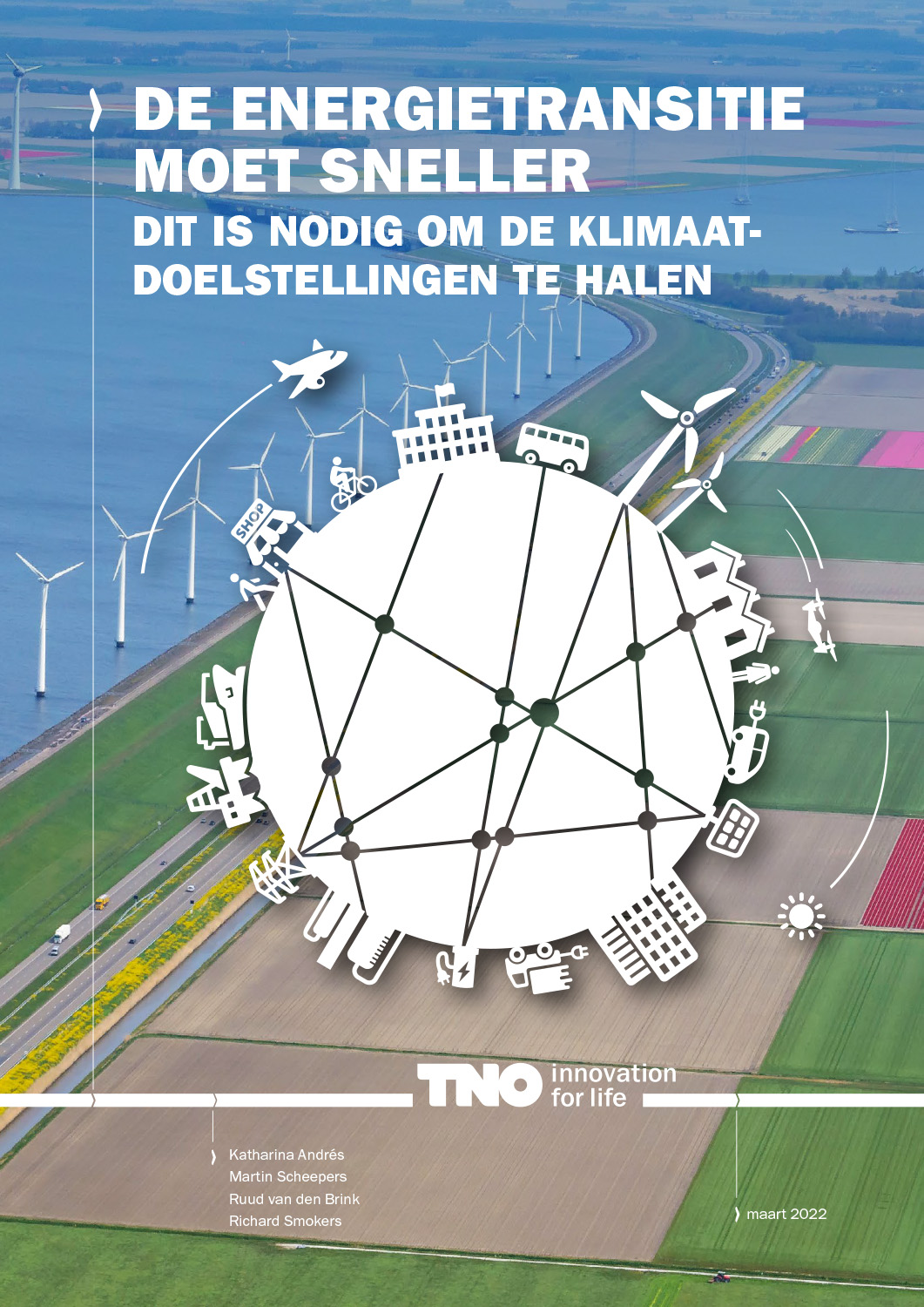
Naast technologische ontwikkeling is ons gedrag cruciaal om de energietransitie te versnellen. We hebben een integrale aanpak nodig waarin oog is voor de onderlinge samenhang tussen de verschillende sectoren en de relatie met andere grote maatschappelijke vraagstukken.
Onze broeikasgasemissies moeten sneller omlaag om de in Parijs afgesproken doelstellingen te halen en de aarde leefbaar te houden voor de jongere en toekomstige generaties. Hoe langer het duurt, hoe kleiner de kans van slagen. Wat is er daarvoor nodig? Dat is natuurlijk niet in een paar zinnen samen te vatten. Twee aspecten vind ik echter wel duidelijk.
Te vaak wordt de energietransitie nog als een vooral technologisch probleem gezien. Het vertrouwen lijkt groot dat we het allemaal met betere technologie gaan oplossen. Maar dat klopt niet. Alhoewel technologische innovatie en vooruitgang een belangrijke rol spelen, moeten we eerlijk en duidelijk zijn over het feit dat verandering van ons gedrag en consumptiepatronen net zo hard nodig zijn.
Persoonlijk schrik ik ervan als ik me realiseer hoe alleen al tijdens mijn eigen leven de consumptie van bijvoorbeeld spullen en mobiliteitsdiensten ontwikkeld is naar steeds meer, sneller en verder. Om deze ontwikkeling te keren zijn eerlijke prijzen voor producten en diensten nodig waarin die emissies zijn meegenomen. Maar er zijn ook nieuwe verhalen nodig die laten zien dat er alternatieven zijn voor onze huidige manier van doen.
De sustainable development goals van de VN zijn hier een goed voorbeeld van. Zij houden rekening met gezondheid, onderwijs, verminderen van ongelijkheid, verantwoordelijke consumptie en biodiversiteit, naast verantwoorde economische groei.
Een duidelijk tweede aspect, is de noodzaak voor een integrale aanpak. In deze transitie moet van alles gebeuren. Tegelijkertijd moeten we zorgen dat de reductie van broeikasgasemissies niet andere problemen vergroot of zelfs veroorzaakt, zoals het uitputten van schaarse materialen, aanvullende druk op de biodiversiteit of het vergroten van de ongelijkheid in onze maatschappij en in de wereld.
Versnelling vraagt natuurlijk vooral om doen of “actie, actie actie!”, zoals Premier Mark Rutte bij de klimaattop in Glasgow zei. Een goede onderbouwing met kennis helpt om bewuste en toekomstbestendige keuzes te maken. Hier ligt ook onze verantwoordelijkheid als onderzoeksinstituten. Laten we samen een goede kennisbasis maken voor een succesvolle energietransitie.
Met de publicatie “De energietransitie moet sneller – dit is nodig om de klimaatdoelstellingen te halen” willen wij de discussie over wat kan en wat nodig is voor de versnelling van de energietransitie voeden en beslissers en beleidsmakers bij overheden en het bedrijfsleven een overzicht bieden over hoe alles met elkaar samenhangt.
Wat kunnen we samen betekenen voor de energietransitie in Nederland?
Deze blogbijdrage is geschreven door Katharina Andrés, Plaatsvervangend Onderzoeksmanager TNO Energietransitiestudies

In addition to technological developments, our behaviour is crucial to accelerate the energy transition. We need an integrated approach which takes into account the interrelationship between the different sectors and the relationship with other major social issues.
Our greenhouse gas emissions must be reduced faster to meet the targets agreed in Paris and to keep the earth livable for younger and future generations. The longer it takes, the smaller the chance of success. What is needed to achieve this? Of course, this cannot be summarised in a few sentences. However, two aspects are clear to me.
Too often, the energy transition is still seen as a primarily technological problem. There seems to be great confidence that we will solve it all with better technology. But that is not the case. Although technological innovation and progress play an important role, we must be honest and clear about the fact that changes in our behaviour and consumption patterns are just as necessary.
Personally, I am shocked when I realise how, in my own lifetime alone, the consumption of things and mobility services, for example, has developed into ever more, faster and further. To reverse this trend, we need fair prices for products and services that take these emissions into account. But we also need new stories that show that there are alternatives to our current way of doing things.
The sustainable development goals of the UN are a good example of this. They take into account health, education, reducing inequality, responsible consumption and biodiversity, in addition to responsible economic growth.
A clear second aspect is the need for an integral approach. In this transition, everything has to be done. At the same time, we must ensure that the reduction of greenhouse gas emissions does not increase or even cause other problems, such as the depletion of scarce materials, additional pressure on biodiversity or the increase of inequality in our society and in the world.
Acceleration, of course, mainly requires doing, or “action, action!”, as Prime Minister Mark Rutte said at the climate summit in Glasgow. A good foundation of knowledge helps to make conscious and future-proof choices. This is also our responsibility as research institutes. Let’s work together to create a good knowledge base for a successful energy transition.
With the publication “The energy transition must be faster – this is necessary to achieve the climate objectives”, we want to feed the discussion about what is possible and what is necessary to accelerate the energy transition and provide decision and policy makers in government and industry with an overview of how everything relates to each other.
What can we do together for the energy transition in the Netherlands?
This blog contribution is written by Katharina Andrés, Deputy Research Manager TNO Energy Transition Studies
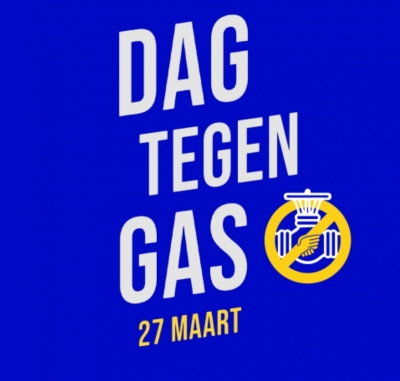
Met een groep experts uit de energiewereld en creatieve sector roepen we 27 maart uit tot de DAG tegen GAS. Het is namelijk tijd voor tegengas tegen de afhankelijkheid van Russische fossiele brandstoffen. Dit doen we voor 🇺🇦Oekraine, voor een lagere energierekening en voor het vertragen van klimaatverandering. Hoe? We willen middels deze landelijke dag zoveel mogelijk gas-gebruikers aansporen hun energie verbruik, systematisch, te verminderen.

Together with a group of experts from the energy and creative sectors, we are declaring 27 March to be the DAY against GAS. It is time to take a stand against our dependence on Russian fossil fuels. We will do this for 🇺🇦Ukraine, for a lower energy bill and for slowing down climate change. How? Through this national day we want to encourage as many gas users as possible to systematically reduce their energy consumption.
In deze video spreekt professor Paulien Herder van de Technische Universiteit Delft over toekomstige systemen voor defossilisering van de chemische industrie. Ook vertelt ze onder meer over het belang van NERA bij de innovatieagenda en het vinden van partners.
In this video, Professor Paulien Herder of Delft University of Technology talks (in Dutch) about future systems for defossilising the chemical industry. She also talks about the importance of NERA in the innovation agenda and finding partners.
Pleidooi voor een Samenwerkingsprogramma snelle energiebesparing van en voor burgers, bedrijven en overheid: vijf miljard kuub minder aardgas binnen één jaar
14 Maart 2022 – Het is nog nooit zo duidelijk geweest dat we onze energievoorziening radicaal moeten verduurzamen: er is een klimaatcrisis, we zijn afhankelijk van gewelddadige dictators en de energierekening rijst de pan uit. Dit is hét moment om samen in actie te komen.
Snelle energiebesparing en overgang op duurzame energie is de enige structurele weg vooruit: dit lost veel problemen tegelijk op. Als we het samen doen, kan dit snel veel opleveren. Al onze organisaties hebben daar vele tips en oplossingen voor. Ook nu staan we klaar om mensen en bedrijven te helpen.
Plea for a Cooperation programme for rapid energy saving by and for citizens, companies and government: five billion cubic metres less natural gas within one year.
March 14, 2022 – It has never been so clear that we have to make our energy supplies radically more sustainable: there is a climate crisis, we are dependent on violent dictators and energy bills are skyrocketing. This is the moment to take action together. Fast energy saving and transition to sustainable energy is the only structural way forward: it solves many problems at once. If we do it together, it can quickly pay off. All our organisations have many tips and solutions for this. We are also ready to help people and companies.
14-februari 2022 -In deze video spreekt professor Richard van de Sanden over het tot stand komen van de Nationale Wetenschapsagenda (NWA) en de betrokkenheid van NERA – The Netherlands Energy Research Alliance bij de coördinatie van het energie onderzoek in Nederland.
February 14th, 2022 – In this video, Professor Richard van de Sanden talks about the creation of the Dutch Research Agenda (NWA) and the involvement of NERA – The Netherlands Energy Research Alliance in the coordination of energy research in the Netherlands.
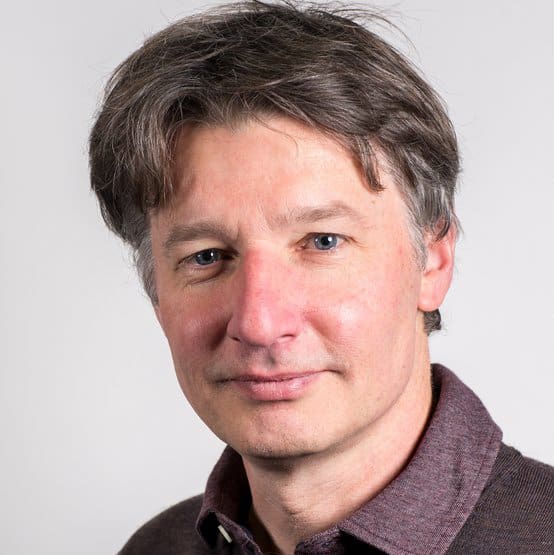
5 februari 2022 – Professor of Energy Technology David Smeulders publiceerde op 5 februari een essay met de titel “Nee, we moeten niet van het gas af (en dat gaan we ook niet)” in dagblad Trouw. David Smeulders is lid van de Scientific Board van NERA. De NERA Scientific Board ontwikkelt en communiceert de positie van NERA in de (inter)nationale energie(innovatie)beleidsarena en in de (inter)nationale energieonderzoeksgemeenschap.

February 5th, 2022 – Professor of Energy Technology David Smeulders published an essay titled “No, we must not get rid of gas (and we won’t)” in daily newspaper Trouw on February 5th. David Smeulders is a member of the Scientific Board of NERA. The NERA Scientific Board develops and communicates NERA’s position in the (inter)national energy (innovation) policy arena and in the (inter)national energy research community. Read the essay here.
20 januari 2022 – In deze video spreken Mark Boneschanscher van de Netherlands Energy Research Alliance (NERA)
en Tijmen Altena van IDfuse/ScienceFinder over de samenwerking waardoor actuele informatie over Energie Onderzoek in Nederland op een laagdrempelige wijze nog sneller kan worden gevonden.
ScienceFinder is een online zoekplatform waar je de juiste experts kunt vinden bij jouw kennisvraag. Door het verder ontsluiten van deze informatie wordt een bijdrage geleverd aan de verspreiding van wetenschappelijke kennis ten behoeve van de energietransitie.
Zie ook: https://www.nera.nl/energy-research-map/
Januari 20th, 2022 – In this video Mark Boneschanscher of the Netherlands Energy Research Alliance (NERA) and Tijmen Altena of IDfuse/ScienceFinder talk about their collaboration, which makes it easier to find up-to-date information about Energy Research in the Netherlands. ScienceFinder is an online search platform where you can find the right experts for your knowledge question. Further unlocking this information will contribute to the dissemination of scientific knowledge for the energy transition. See also: https://www.nera.nl/energy-research-map/January 20th
Door Mark Boneschanscher
18 DECEMBER 2021 – Een voorzichtig gejuich ging gisteren op in de NERA Scientific Board toen enkele passages uit het coalitieakkoord werden voorgelezen.
Zo is ons pleidooi voor grote samenhangende interdisciplinaire programma’s over de hele innovatieketen voor onderzoek en innovatie naar klimaat neutrale technologieën rechtstreeks overgenomen in het coalitieakkoord. En met het instellen van een ministerpost voor klimaat en energie lijkt ook de boodschap geland te zijn dat de overheid meer regie moet voeren op de energietransitie. Waarbij de wetenschap dan richting kan geven door de nog in te stellen onafhankelijke wetenschappelijke adviesraad. Allemaal belangrijke stappen die een voorzichtige trendbreuk lijken in te zetten van het denken dat de vrije markt het allemaal wel zal oplossen naar een groeiend besef dat het allemaal toch wel wat complexer is dan dat.
Waarom dan toch alleen een voorzichtig gejuich en geen knallende champagnekurken? Dat zit hem denk ik in twee punten. Allereerst heerst bij mij na het lezen toch een gevoel van ‘eerst zien, dan geloven’. Bij al de aangekondigde maatregelen en ook de forse investeringen zit het hem echt in de uitvoering. Aanstellen van een minister voor klimaat en energie is prachtig, maar krijgt deze ook een eigen ministerie? Of valt hij/zij straks alsnog onder het Ministerie van EZK? Dat het economisch beleid ontkoppelt moet worden van energie en klimaat lijkt nog steeds niet van harte doorleefd. Zinsneden als ‘onderzoeken van mogelijkheden om financiële prikkels voor fossiele brandstoffen af te bouwen … en waar mogelijk te beëindigen … met het oog op ons vestigingsklimaat’ geven in ieder geval nog niet het gewenste vertrouwen.
Dit brengt me bij het tweede punt. De huidige maatregelen, hoezeer die ook nodig en gewenst zijn, zijn feitelijk oplapmiddelen op het oude systeem. De energietransitie is echter een systeemtransformatie. Een dergelijke transformatie vraagt om een duidelijke visie op hoe het nieuwe systeem er uit gaat zien. Die visie lijkt vooralsnog te ontbreken, waardoor het ook moeilijk is om een helder perspectief te geven op de veranderingen die nodig zijn om dit nieuwe systeem te bereiken. Hopelijk kan de nieuw in te stellen wetenschappelijke adviesraad hier uitkomst bieden. Als deze in een positie wordt gebracht van waaruit ze naast ‘beoordelen en adviseren over het beleid’ een gecoördineerde aanpak op de energietransitie kunnen gaan uitzetten.
Een aanpak waarbij onderzoek voor de doelen van 2030 niet in competitie hoeft met onderzoek voor de doelen van 2050. Maar waarbij onderzoek is georganiseerd in grote samenhangende programma’s die lopen van fundamenteel, toegepast en praktijkgericht onderzoek tot pilots en demonstratieprojecten. En waarin technisch en sociaalwetenschappelijk onderzoek vanaf het begin is gekoppeld. Een aanpak waarbij de financiering dit ook faciliteert, in plaats van – zoals nu – versprokkeld te zijn over allerlei uitvoeringsinstanties, ministeries, topsectoren of missieteams, die met diverse instrumenten verschillende subthema’s en TRL-gebieden proberen te bedienen. Kortom, een gecoördineerde aansturing vanuit een systeemperspectief.
Want alleen met een dergelijke integrale aanpak kunnen we hopen de CO2-emissies versneld te gaan reduceren. Dat is in ieder geval de boodschap die we als NERA met onze position paper naar buiten hebben gebracht en waarvan we nu gelukkig de eerste elementen terugvinden in het coalitieakkoord. Het valt te hopen dat we tijdens de regeerperiode een even luisterend oor blijven vinden als tijdens de coalitievorming. Want uiteindelijk willen we allemaal hetzelfde: de energietransitie zo snel mogelijk uitvoeren tegen zo min mogelijk maatschappelijke kosten en met zo veel mogelijk maatschappelijk draagvlak.
Bekijk hier: NERA Position paper Energie-onderzoek voor de energietransitie.pdf
By Mark Boneschanscher
December 18th 2021 – There were cautious cheers in the NERA Scientific Board meeting when several passages were read from the coalition agreement.
For example, when reading back the plea of NERA for large coherent and interdisciplinary programs, covering the whole knowledge chain, for climate neutral technologies. And with the plan to install a minister for climate and energy, also the message that the government needs to take more control over the energy transition seems to be heard. With science given the role of advisor by installing an independent scientific advisory board. All important steps that seem to break with the philosophy that a free-market economy will solve all our problems, indicating a growing acknowledgement that things are more complicated than that.
Why then only cautious cheers and no popping champagne bottles? I think this is caused by two points. First, after reading the text I was left with a feeling of ‘first seeing then believing’. With all the announced measures and even the significant investments, the devil is in the details of the execution. For example, a new minister for climate and energy is wonderful. But will there also be a separate ministry for this topic? Or will he/she be part of the current Ministry of Economic Affairs and Climate Policy? That economic and climate policy are better separated does not seem to be fully acknowledged. At least passages like (forgive my free translation) ‘looking into possibilities to phase out financial stimuli for fossil fuels … and where possible to end them … with an eye to our business climate’ do not give full confidence yet.
That brings me to the second point. The current measures, how much needed and desired, are all still like patchwork on an old system. The energy transition however is a system transformation. And as such they ask for a vision on how the new system will look like. That vision still seems to be lacking, making it hard to give a clear perspective on the changes that are needed to end up there. Hopefully the new – to be installed – scientific advisory committee can help here. If they are enabled to not only ‘assess and advise the climate policies’ but to set up a coordinated execution plan for the energy transition.
A plan where research for the 2030 targets does not longer compete with research for the 2050 targets. But where it is organized in large coherent programs, ranging from fundamental, applied, and application-oriented research, to pilots and demonstration projects. Where technical and social sciences are coupled from the very start. And where funding instruments facilitate this, in stead of the current situation in which they are scattered over different executive bodies, ministries, topsectors or mission teams, that each have different instruments, (sub)topics, and TRL-ranges. In short, a coordinated execution plan from a systems perspective.
Because only with such an integral approach we can hope to accelerate the reduction of CO2-emissions. This is also the message we that delivered in the NERA position paper, and of which we are happy to find the first traces back in this coalition agreement. Let’s hope that we will find an equally listening ear during the term of office of the new to be formed government. Because in the end we all want the same: executing the energy transition as fast as possible against minimal societal costs and with maximal societal support.
View: NERA Position paper Energy research for the energy transition.pdf
Door Gert Jan Kramer en Sanne Akerboom
NOVEMBER 2021 – Politieke partijen discussiëren over klimaatdoelen en de wenselijkheid van energietechnieken. Maar ze zwijgen over de nieuwe taken van de overheid die daarbij nodig zijn.
De verkiezingsprogramma’s staan vol mooie woorden over de klimaatdoelen voor 2030 en daarna. Bij onze analyse van de programma’s kwamen we echter weinig concrete plannen tegen om die doelstellingen te halen. Dat is tragisch, want alleen met meer sturing van de overheid krijgt de energietransitie voldoende vaart.
In de discussie gaat het vooral over doelen in de verre toekomst en welke duurzame technieken we daarvoor willen inzetten. Maar we zullen alle beschikbare technieken nodig hebben om in de buurt van die doelen te komen. Veel te kiezen valt er niet. De echte vraag is hoe de overheid meer regie kan nemen.
Lees hier meer: Opiniestuk (PDF)
By Gert Jan Kramer and Sanne Akerboom
NOVEMBER 2021 –
Political parties discuss climate goals and the desirability of energy technologies. But they are silent about the new tasks of the government that are required.
The election programs are full of nice words about the climate goals for 2030 and beyond. However, in our analysis of the programs we found few concrete plans to achieve those objectives. That is tragic, because the energy transition will only gain sufficient momentum with more government guidance.
The discussion focuses mainly on goals in the distant future and which sustainable techniques we want to use for that purpose. But we will need all available techniques to get close to those goals. There is not much to choose from. The real question is how the government can take more control.
Read more: Opinion piece (Dutch) (PDF)
NOVEMBER 2021 – Op 21 oktober is het project “New Routes for the Energy Transition” officieel van start gegaan. De komende tien maanden zetten TNO, Universiteit Utrecht (UU) en DIFFER nieuwe landelijke onderzoeksgemeenschappen op om de energietransitie te versnellen. NWO financiert drie projecten gericht op ruimtelijke ordening, toekomstige energie-infrastructuur en de zakelijke uitdaging voor de energietransitie. TNO, UU en DIFFER gaan nieuwe communities creëren om relevante kennis – zowel uit de wetenschap als uit de samenleving – samen te brengen.
Tijdens een productieve bijeenkomst met haar projectleden, georganiseerd door de Universiteit Utrecht, werden de projecten in detail besproken en werden belangrijke cross-overs geïdentificeerd. Vooral dit laatste aspect is van belang omdat de energietransitie samenwerking tussen verschillende disciplines vereist.
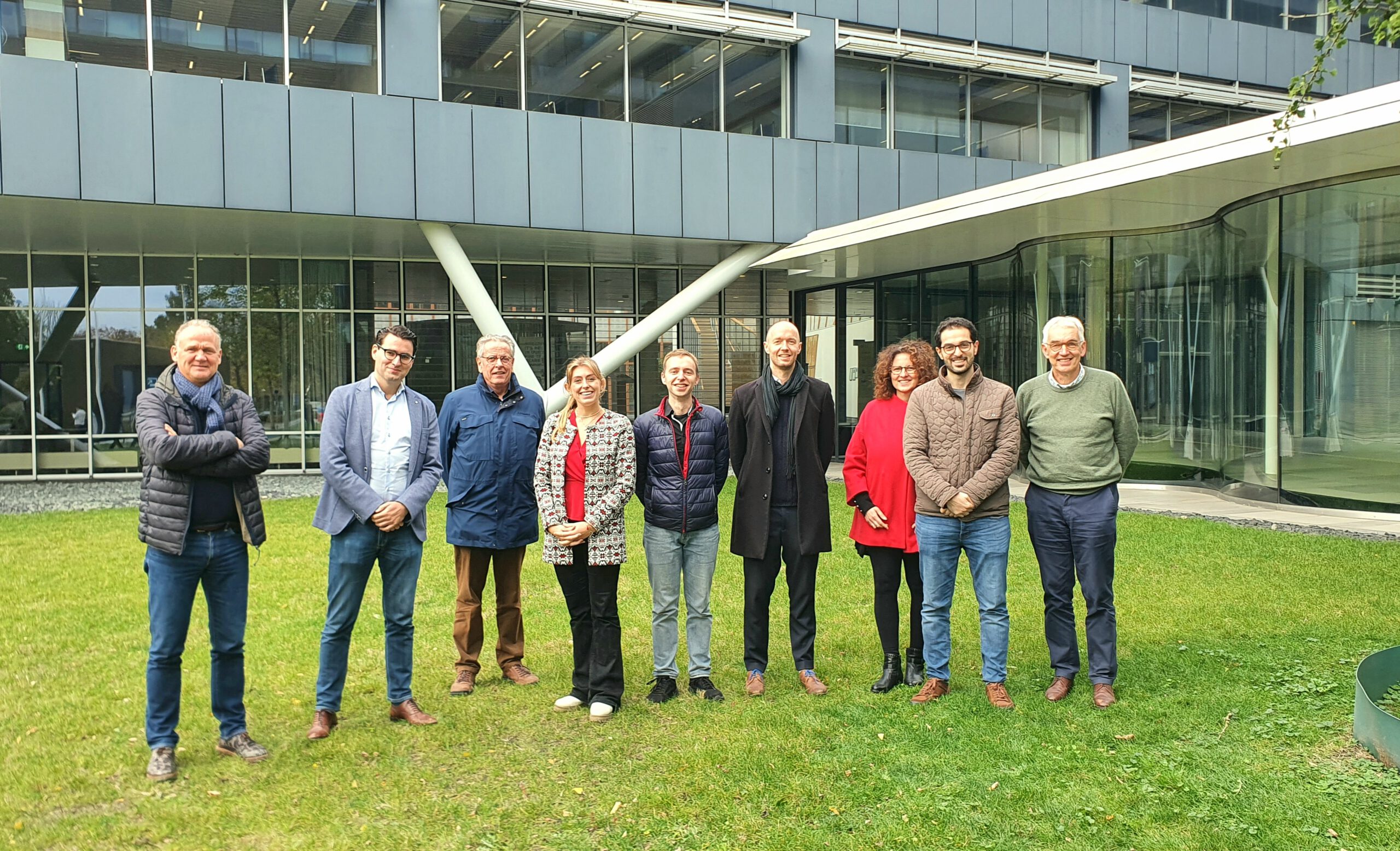
Foto: De kick-off deelnemers van Universiteit Utrecht, TNO, NERA, NWO en DIFFER.
NERA-rol
Dat is waar NERA om de hoek komt kijken. NERA – de Netherlands Energy Research Alliance brengt de Nederlandse onderzoeksinstellingen die werken aan duurzame energie samen en begeleidt de Nationale Wetenschapsagenda-route Energietransitie. De eerste antwoorden in deze projecten zullen naar verwachting leiden tot nieuwe onderzoeksvragen en consortia die in het kader van het traject Energietransitie verder kunnen worden ontwikkeld. De focus van deze onderzoeksprojecten werd bepaald door de Wetenschappelijke Raad van NERA
Mix van energiedragers: infrastructuur
Eén project zal zich concentreren op het multi-energiedragerkarakter van het toekomstige circulaire energiesysteem. Gezien de transitie waarin we ons bevinden, is het vooralsnog onduidelijk hoe de mix van energiedragers in ons toekomstige CO2-neutrale energiesysteem eruit zal zien. Maar we kunnen niet wachten om de benodigde grootschalige infrastructuur te bouwen. Het doel van dit project is dan ook om de juiste processen en procedures op te zetten om te komen tot een systeemontwerp van de toekomstige energie-infrastructuur, ondanks de huidige onbekenden. Richard van de Sanden en Beatrix Bos van DIFFER voeren dit deelproject uit.
Ruimtelijke ordening
Het belang van ruimtelijke ordening in de energietransitie neemt snel toe. Onderzoeksvragen in het tweede project zijn hoe om te gaan met concurrerende claims, en hoe processen en procedures te verbeteren om de energietransitie beter te integreren in de omgeving.
Investering onder onzekerheid
Het derde onderwerp is de zakelijke uitdagingen voor de (Nederlandse) industrie. Het Nationaal Klimaatakkoord biedt een lange termijn strategische afstemming op doelen, maar er is nog geen robuuste visie op de weg naar 2050, noch een gedeelde visie op de 2050 portfolio van industriële activiteiten. Dit leidt tot investeringen onder onzekerheid. Doel van dit deelproject is om te onderzoeken hoe met deze onzekerheden om te gaan en het toekomstige investeringsklimaat te verbeteren.
Consortiumpartners
DIFFER, Universiteit Utrecht, TNO, Sustainable Industry Lab, Sustainable Finance Lab, EIRES
We zijn al op zoek naar partners voor onze nieuwe onderzoeksgemeenschap. Wil je meer info ontvangen of meedenken, neem dan contact op met Leo Dvortsin van NERA: l.dvortsin@rug.nl
Meer informatie:
https://www.differ.nl/network/joint-programs
During a productive meeting with its project members, hosted at Utrecht University, the projects were discussed in detail and major crossovers were identified. Especially this last aspect is of importance as the energy transition requires collaboration across different disciplines.

Photo: The kick-off participants from Utrecht University, TNO, NERA, NWO and DIFFER.
NERA role
That is where NERA comes in. NERA – the Netherlands Energy Research Alliance brings together the Dutch research institutions working on renewable energy and oversees the Dutch National Research Agenda route Energy Transition. First answers in these projects are expected to lead to new research questions and consortia that can be further developed in the context of the Energy Transition route. The focus of these research projects was determined by the Scientific Board of NERA
Mix of energy carriers: infrastructure
One project will concentrate on the multi-energy carrier character of the future circular energy system. Given the transition we are in, it is as of yet still unclear what the mix of energy carriers in our future carbon neutral energy system will look like. But we cannot wait to build the necessary large-scale infrastructure. Therefore, this project aims to set up the right processes and procedures to come to a system design of the future energy infrastructure, despite the current unknowns. Richard van de Sanden and Beatrix Bos from DIFFER will carry out this subproject.
Spatial planning
The importance of spatial planning in the energy transition increases rapidly. Research questions in the second project are how to deal with competing claims, and how to improve processes and procedures to better integrate the energy transition into the environment.
Investment under uncertainty
The third topic is business challenges for (Dutch) industry. The National Climate Agreement offers a long-term strategic alignment on goals, but there is not yet a robust view on the path towards 2050, nor a shared vision on the 2050 portfolio of industrial activities. This leads to investment under uncertainty. Goal of this subproject is to investigate how to cope with these uncertainties and how to improve the future investment climate.
Consortium partners
DIFFER, Utrecht University, TNO, Sustainable Industry Lab, Sustainable Finance Lab, EIRES
We are already looking for partners for our new research community. If you would like to receive more info or think along, please contact Leo Dvortsin of NERA: l.dvortsin@rug.nl
More information
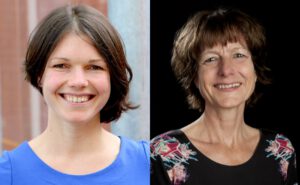
19 juli 2021 – In de video hieronder vertellen Hoogleraar Omgevingspsychologie Linda Steg en Universitair Docent Omgevingspsychologie Goda Perlaviciute, beiden van de Rijksuniversiteit Groningen, over het belang van sociale wetenschappen bij de energietransitie.
De energietransitie is niet alleen een technische maar ook een maatschappelijke uitdaging. Om de energietransitie mogelijk te maken, is het nodig dat mensen hun gedrag veranderen, zoals minder en efficiënter energie verbruiken, en overstappen naar duurzame energiebronnen. Bovendien is het belangrijk dat er voldoende maatschappelijk draagvlak is om veranderingen in energietechnologieën, energiesystemen, en energiebeleid te implementeren.
De sociale wetenschappen bieden belangrijke inzichten in welke factoren invloed hebben op duurzaam gedrag van mensen en op maatschappelijk draagvlak voor duurzame energietechnologieën, systemen, en beleid. De energietransitie is alleen mogelijk wanneer er rekening wordt gehouden met wat mensen motiveert en in staat stelt om bij te dragen aan de energietransitie.

The energy transition is not only a technical but also a social challenge. To enable the energy transition, it is necessary for people to change their behaviour, such as using less and more efficient energy, and switching to sustainable energy sources. Moreover, it is important that there is sufficient social support to implement changes in energy technologies, energy systems and energy policy.
The social sciences provide important insights into which factors influence sustainable behavior of people and public support for sustainable energy technologies, systems, and policy. The energy transition is only possible when taking into account what motivates and enables people to contribute to the energy transition.
